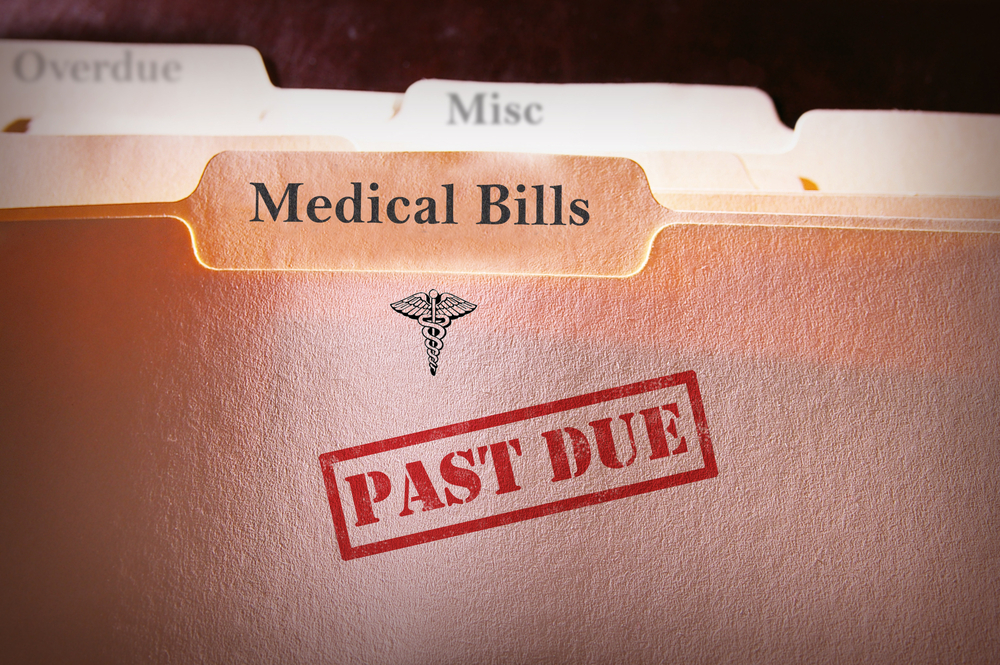When a close friend or family member dies it’s often incredibly upsetting and scary, unpaid medical debt only heightens these feelings. However, you’re not always responsible for paying for them.
When someone dies the debts remaining are often paid out of their estate prior to the inheritance. However, there are some exceptions. For example, if you’ve had a joint loan agreement or been the guarantor of a loan.

The most notable exception is the new legislation which has been issued in more than 30 states which makes it possible for the child of a parent to inherit medical debt if the entire value of the person’s estate does not cover the cost.
In this article, we’ll look to explore the different circumstances to consider when trying to figure out if you’re responsible for the debt as the benefactor of an estate.
What Is An Estate
An estate is the total assets of a person or persons. The items which make up an estate include;
- Cash
- Life insurance policies
- Stocks and bonds
- 401k contributions
- Properties
- Possessions
- Cars
- Planes
- Boats
Although the process is slightly more common for shared items.
If an individual’s estate is worth more than a certain amount (the amount and items included within the estate vary between states) then the inheritance goes into probate (although with the right preparation this can often be avoided).
How The Debt Is Removed From An Estate
When someone dies owing debt, the debt doesn’t go away. Instead, the persons in charge of the estate become responsible for paying any unpaid debts from the total value of the estate.
This debt is not to be paid from the persons responsible for the estate directly unless;
- They were a co-signer on the loan in which case the co-signer will owe the entire debt amount.
- The account is jointly owned (such as a joint credit card or overdraft) in which case the other account holder is responsible for paying the debt.
- If state laws require a spouse to pay a specific type of debt (as far as I am aware this does not include medical bills in any state)
The final major exception to this rule is if the estate is insolvent this means that the estate is valued at less than the total debt. For example, the estate is only worth $300,000 but the debt is actually $500,000.

When this happens you will receive no inheritance, however, in the majority of cases you’ll still not be responsible for any additional debts.
However, there is an exception to medical bills and medical debt in more than 30 states. This exception has been instituted by law in more than 30 states. However, it seems to only currently apply to children.
Most articles online suggest that this law is rarely enforced in the states it applies to and in the case that the estate benefactors are not the child of the deceased you may not be required to pay the debt.
It’s important to discuss everything with an estate planner who will be able to review your current situation and advise you on how to proceed.
The process of removing debt from an estate begins with the sale of any assets. Then fiduciary fees, attorney fees, executor costs, and estate taxes are paid. Closely followed by the burial and funeral costs.
If any of the family members of the deceases depended on them for providing basic living expenses these will be provided with in the form of a family allowance.
Following this, any federal taxes and property taxes owed will be removed, alongside any medical expenses and debt which has not been covered by the person’s insurance.

Finally, credit cards and personal loans will be removed from the value of the estate.
Secured debts on assets such as a car loan or mortgage also need to be paid after the account holders’ death. The holder of the estate bond will either reclaim the property or a person on the estate could look to refinance the debt to keep the property.
It’s worth discussing with your financial advisor if this is in your best interest personally (I am not a financial advisor, this is just my experience).
I have found in the past you tend to get a better value refinancing the estate and then selling it than you do the bondholder selling it and giving you any remaining funds post the removal of the value remaining on the mortgage however this really does vary depending on the circumstances.
Spouce Debt Responsibilities
In a community property state, spouses share any debt incurred during the marriage, even if only one spouse signed for it.
This includes everything; car payments, medical bills, credit card debt, personal loans, mortgages etc…

The important thing to note is that this is only applicable to debts that occurred during the marriage.
Therefore, if the medical bill/debt was created in 2002, but you didn’t marry until 2004, you will not be responsible for the debt, however, it will likely still be removed from the value of the estate.
There are some additional circumstances and conditions to consider so again, it’s best to consult an estate planner if you live in one of these states.
Important Take Aways
Hopefully, you’ve been able to read this article prior to a loved one’s death and can take actionable steps to ensure that debts are paid prior to the formation of an estate (where possible).
Be sure that everyone responsible for the estate is aware of the financial situation and discuss your options in detail with an estate planner.

I’ve certainly found that simply being aware of a loved one’s financial circumstances (especially if your set to inherit the estate) can put both you and them in a better position moving forward.
Bringing this subject up can be difficult, personally I’ve found it best to pair it with a discussion about where any important paperwork is kept and any funeral plans and burial wishes.
Taking these situations to an estate planner prior to a loved one’s death can significantly help you in fast-tracking the process should a loved one pass away and put you and your family in the best position moving forward.
